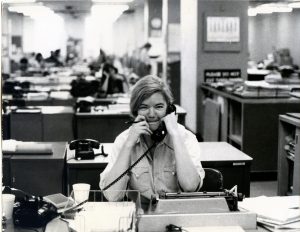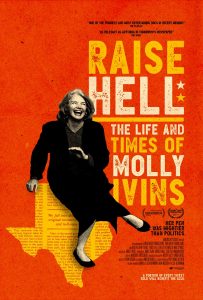“Raise Hell: The Life & Times of Molly Ivins” (2019). Cast: Molly Ivins. Interviews: Dan Rather, Rachel Maddow, Lou Dubose, Jim Hightower, Andy Ivins, Sara Ivins Maley, Carlton Carl, Dave “Moose” McNeely. Archives: George W. Bush, George H.W. Bush, Ann Richards, David Letterman, Morley Safer, John Henry Faulk. Director: Janice Engel. Screenplay: Janice Engel and Monique Zavistovski. Web site. Trailer.
Getting the word out about what’s really going on can be quite a challenge, especially when those in the know may try to conceal the truth, soft-peddle its implications or spin it to their personal advantage. Overcoming that takes a writer-investigator who’s willing to dig deep and to keep from caving in to pressure to doctor the information to fulfill a particular agenda. It also helps to inject a little humor to attract and keep the audience’s attention. So it was for a crafty reporter who managed to pull off all of the foregoing, a career chronicled in the enlightening and entertaining new documentary, “Raise Hell: The Life & Times of Molly Ivins.”
Even in the heyday of newspapers, it was a rather rare feat for journalists in that medium to attain national acclaim. But one who achieved that – and did so by creating a readily distinguishable persona for herself – was Molly Ivins (1944-2007). The outspoken, salty-tongued reporter who channeled those qualities into her work managed to steadily rise up through the ranks of her field. She became a print icon who not only had avid readers, but, more precisely, a constituency, one that hung on her wisecracks and her pearl-handled wisdom.
So what made Molly so charismatic? In essence, readers knew who she was and where she was coming from. She carefully crafted a writing style that set her apart from many of her peers (often penning her stories in first person, for example, a practice generally considered a journalistic no-no), covering topics with her acerbic wit and mastering the art of being able to knock down sacred cows, particularly in the political establishment. But, more than that, she created a distinctive, readily identifiable image for herself, one of a seemingly oxymoronic nature – that of a hard-drinking, pickup-driving Texas liberal.
[caption id="attachment_11001" align="aligncenter" width="300"] Salty-tongued Texas journalist Molly Ivins made quite a name for herself with her wisecracking writing and hard-partying way of life as seen in the candid new documentary, “Raise Hell: The Life & Times of Molly Ivins.” Photo courtesy of Magnolia Pictures.[/caption]
Salty-tongued Texas journalist Molly Ivins made quite a name for herself with her wisecracking writing and hard-partying way of life as seen in the candid new documentary, “Raise Hell: The Life & Times of Molly Ivins.” Photo courtesy of Magnolia Pictures.[/caption]
At the risk of overgeneralizing, as contradictory as that label might seem, Molly embraced it to set her apart from the more “conventional” liberal stereotype. By coming across as a typical, tough-talking Texas girl who just happened to adhere to left-leaning sentiments, she won over the hearts and minds of many who may not have otherwise given her the time of day. To readers, she came across more like “one of us” than those who put on airs in making their views known.
Molly’s worldview came out of her upbringing. She indeed loved being from the Lone Star State, but she also questioned the staunchly conservative values that seemed everywhere around her, especially in her family life. Having been born the daughter of “General Jim” Ivins, a strict, authoritarian oil and gas company executive, she was routinely subjected to his rigid right-wing ideologies, ideas that riled her into vociferously expressing her polar opposite viewpoints. This independent streak soon led to study at a prestigious Houston college prep school and then enrollment at the respected liberal arts institution, Smith College, a course of study that included a year abroad in Paris. Through her studies, she developed an aptitude for writing, the springboard for her career.
After graduating from Smith and earning a master’s degree in journalism from Columbia University, Molly launched her life as a writer and reporter by working for The Houston Chronicle and The Minneapolis Tribune. But Molly truly cut her teeth as a journalist by covering Texas politics (most notably the state legislature) for The Texas Observer. Through her reporting of that esteemed yet often-farcical institution, she sharpened her sense for spotting and calling out corruption, self-interest and downright political idiocy. She was off and running.
After leaving the Observer, Molly took her talents to The New York Times, which hired her because of a concern that the paper’s writing style had grown too staid and bland. Ivins was brought aboard to shake things up, but, once there, she was regularly hemmed in by the button-down culture of the Times, preventing her from doing what she was brought on board to do. After a comical falling out with Times editor Abe Rosenthal, Molly packed her bags and returned to Texas, taking a job as columnist for The Dallas Times Herald. Ivins held that job for 10 years, receiving two Pulitzer Prize nominations, before moving on to The Fort Worth Star-Telegram, where she worked until becoming an independent syndicated columnist and published author.
[caption id="attachment_11002" align="aligncenter" width="300"] Covering the circus that often is the Texas state legislature, reporter Molly Ivins brought wit and wisdom to her readers as chronicled in director Janice Engel’s smart new documentary, “Raise Hell: The Life & Times of Molly Ivins.” Photo courtesy of Magnolia Pictures.[/caption]
Covering the circus that often is the Texas state legislature, reporter Molly Ivins brought wit and wisdom to her readers as chronicled in director Janice Engel’s smart new documentary, “Raise Hell: The Life & Times of Molly Ivins.” Photo courtesy of Magnolia Pictures.[/caption]
Along the way, Molly became quite acquainted with many of journalism’s elite and with many prominent politicians, both in Texas and nationally. Among those she befriended was Texas Gov. Ann Richards (D), the rollicking keynote speaker at the 1988 Democratic National Convention. Richards and Ivins were kindred spirits cut from the same cloth, especially when it came to their hard-partying ways, a habit that eventually led to both of them seeking assistance for substance abuse.
While Richards recovered from her condition, Ivins, unfortunately, struggled with it. She had convinced herself that alcohol was so much a part of her work and her image that she had difficulty giving it up. She often used drinking as a tool for getting stories out of sources, her ability to hold vast quantities of liquor often enabling her to hold her own during drawn-out tippling sessions with the good ole boys of Texas politics. But, unfortunately, it went beyond that, so much so that, when she went for one of her job interviews, she took her own six-pack with her.
Somehow, though, Molly managed to hold it together well enough as a functional alcoholic to have a storied and successful career. That career, though, ran into a brick wall when she was diagnosed with an aggressive form of breast cancer in 1999. Molly fought the illness for nearly seven years, even drawing upon her signature sarcasm when discussing her circumstances (she named her breast tumor “Newt” in honor of House Speaker Newt Gingrich (R), one of her least favorite politicians). In the end, the disease overpowered the tough-talking Texan, but, in this ordeal, as in the rest of her life and career, she fought the good fight – and nobody could credibly say otherwise.
Over time, Molly could clearly see the nature of her mission in life, and the more practiced she became at it, the more it became entrenched in her thoughts, acts and deeds. And the more she worked at honing this calling, the more effective she became at it. None of that would have been possible, however, without her beliefs in herself and her ability to carry out this task. Such is what comes from the conscious creation process, the philosophy that maintains we manifest the reality we experience through the power of our thoughts, beliefs and intents. It’s not clear whether Molly had ever heard of this practice, let alone made deliberate use of it, but, given the results she attained, it’s apparent she had mastered its principles, whether or not she was aware of it.
Key among the beliefs that enabled her to function so effectively was an absolute fearlessness toward the work she undertook, an outlook she developed under the thumb of her authoritarian father and the state culture under which she grew up. In Texas, where machismo reigns supreme, Ivins refused to be steamrolled by the strong-arm, testosterone-laden attitudes of those who sought to control everything by serving self-interests first and pushing aside anyone unwilling to play their game. Molly hung tough with those seeking to control the agendas and wasn’t afraid to expose their foibles when they reared their ridiculous and ugly heads, something she uncovered quite often. That gave her the confidence to proceed with her mission, while simultaneously reinforcing her beliefs in her ability to do so.
[caption id="attachment_11003" align="aligncenter" width="300"] Though brought aboard to shake things up at the staid New York Times, rambunctious journalist Molly Ivins often ran afoul of the paper’s button down culture as explained in the new documentary, “Raise Hell: The Life & Times of Molly Ivins.” Photo courtesy of Magnolia Pictures.[/caption]
Though brought aboard to shake things up at the staid New York Times, rambunctious journalist Molly Ivins often ran afoul of the paper’s button down culture as explained in the new documentary, “Raise Hell: The Life & Times of Molly Ivins.” Photo courtesy of Magnolia Pictures.[/caption]
This, in turn, allowed Molly to have the courage to be herself, no matter how much her views and outlooks deviated from expected norms. Ivins never hesitated to speak her mind, both in person and in print, despite being part of a liberal minority in an otherwise-conservative state. She championed the causes of civil liberties and helping the downtrodden on both the state and national level, especially when initiatives in these areas were threatened by the tactics of the privileged looking out for themselves. While Republicans were her usual targets in these regards, she was also willing to take on those who claimed to be the friends of the underprivileged, such as she did in 1996, when she criticized President Bill Clinton’s (D) welfare reform plan.
In leveling her criticisms, Molly made frequent use of her signature weapon – humor. She believed it to be a unifying force, one that could uncannily draw smiles from both supporters and opponents of her viewpoints. She was expert at landing zingers, especially against pompous, blowhard politicians, a skill that would allow her to benignly but effectively shine a bright light on blatant boondoggles and rampant incompetence. And, in many instances, her one-liners worked wonders, exposing the fools for who they really were, even if her efforts were linked to circumstances that were ultimately no laughing matters.
Another of Molly’s formidable tools was her intuition, one of the two key components that contributes to belief formation. It enabled her to successfully size up situations for what they were, often allowing her to see things that others would miss. For example, given her extensive experience in covering the backslapping, smoke-filled room dealings of Texas-style politics, she became concerned when Gov. George W. Bush (R) announced his candidacy for President in 2000. She feared that, if Bush were to be elected, it would initiate a roll-out of Lone Star-style politics on a national scale, a prediction that many now contend came true and set a new standard, a legacy that we’re now left to wrestle with. Indeed, for what it’s worth, Molly’s intuition allowed her to see the future.
There’s a potent cautionary tale in that. Ivins sought to send us messages to heed, and their importance is just as significant now as they were at the time she penned them. Many of the issues that she tried to warn us about were in their early stages and have grown more acute since then. We’d be wise to consider going back and reading (or re-reading) what she wrote to sharpen our own insights into what’s happening – and what could happen if we ignore her warnings.
This thus illustrates the nature of Molly’s ultimate destiny, something that she pursued throughout her life and that has carried on even after her death. It’s essentially her expression of the conscious creation principle known as value fulfillment, the concept associated with living our lives as our best, truest selves for the benefit of ourselves and those around us. In this regard, Ivins clearly walked her talk, setting an example for those in her field and for anyone who cares about the kinds of issues she championed. We could use more like her these days; we can only hope that her story inspires others to follow in her footsteps.
This frank, no-holds-barred look at the life of one of the most celebrated straight-shooting professionals in her field provides a rip-roaring look at her career, filled with ample wit and wisdom typical of her signature style. Through an excellent compilation of archive footage and interviews with those who knew her and valued her work, such as journalists Dan Rather and Rachel Maddow, director Janice Engel’s offering provides viewers with an insightful inside look at Molly’s professional and personal life, as well as the legacy she left behind. This film reminds us what journalism can – and should – be, a profession that these days is only a shadow of its former self. Let’s hope this picture helps to inspire the would-be Mollys out there who want to become what she was.
In an age when the powers that be are striving to stifle dissent, it’s more important than ever to raise a little hell when called for. Molly Ivins recognized the importance of that and employed the tactic whenever appropriate, even under prevailing circumstances that were more relaxed than they are now. Given what we’re increasingly up against, we should take her message to heart. So get ready to beat those drums – and laugh our way through it.
Copyright © 2019, by Brent Marchant. All rights reserved.
Wednesday, September 25, 2019
‘Raise Hell’ profiles one writer’s pursuit for truth
Subscribe to:
Post Comments (Atom)

No comments:
Post a Comment